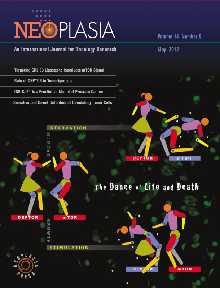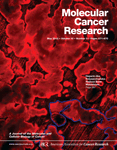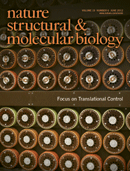Cancer Cell:端粒损伤介导四倍体形成促发癌变
2012-06-17 bo 生物谷
6月12日,Cancer Cell杂志报道了关于端粒失调与异常核型细胞产生及肿瘤发生之间关系的最新研究。 人类亚四倍体核型肿瘤细胞被认为起源于四倍体前体细胞,但形成四倍体的起因尚不明了。此前,有研究证实,小鼠细胞核内复制伴有持续的端粒功能失调和全基因组范围的DNA损伤。 本研究发现,在人类成纤维细胞和乳房上皮细胞端粒危机时,伴有核内复制和有丝分裂失调。研究者还发现p53和Rb可抑制四倍体形成。

6月12日,Cancer Cell杂志报道了关于端粒失调与异常核型细胞产生及肿瘤发生之间关系的最新研究。
人类亚四倍体核型肿瘤细胞被认为起源于四倍体前体细胞,但形成四倍体的起因尚不明了。此前,有研究证实,小鼠细胞核内复制伴有持续的端粒功能失调和全基因组范围的DNA损伤。
本研究发现,在人类成纤维细胞和乳房上皮细胞端粒危机时,伴有核内复制和有丝分裂失调。研究者还发现p53和Rb可抑制四倍体形成。利用可诱导系统造成短期端粒破坏,研究者发现端粒驱动的四倍体形成加强了小鼠细胞的癌性转化。遗传导致的肿瘤,类似于人类实体瘤,演变出亚四倍体核型。这些数据证实,特别短的端粒诱导了端粒驱动的四倍体形成。这在癌性损伤早期具有促进肿瘤发生的潜能。(生物谷bioon.com)

doi:10.1016/j.cell.2011.10.017
PMC:
PMID:
Telomere-Driven Tetraploidization Occurs in Human Cells Undergoing Crisis and Promotes Transformation of Mouse Cells
Teresa Davoli, Titia de Lange
Human cancers with a subtetraploid karyotype are thought to originate from tetraploid precursors, but the cause of tetraploidization is unknown. We previously documented endoreduplication in mouse cells with persistent telomere dysfunction or genome-wide DNA damage. We now report that endoreduplication and mitotic failure occur during telomere crisis in human fibroblasts and mammary epithelial cells and document the role of p53 and Rb in repressing tetraploidization. Using an inducible system to generate transient telomere damage, we show that telomere-driven tetraploidization enhances the tumorigenic transformation of mouse cells. Similar to human solid cancers, the resulting tumors evolved subtetraploid karyotypes. These data establish that telomere-driven tetraploidization is induced by critically short telomeres and has the potential to promote tumorigenesis in early cancerous lesions.
本网站所有内容来源注明为“梅斯医学”或“MedSci原创”的文字、图片和音视频资料,版权均属于梅斯医学所有。非经授权,任何媒体、网站或个人不得转载,授权转载时须注明来源为“梅斯医学”。其它来源的文章系转载文章,或“梅斯号”自媒体发布的文章,仅系出于传递更多信息之目的,本站仅负责审核内容合规,其内容不代表本站立场,本站不负责内容的准确性和版权。如果存在侵权、或不希望被转载的媒体或个人可与我们联系,我们将立即进行删除处理。
在此留言














#Cell#
60
#CEL#
60
#损伤#
59
#癌变#
65